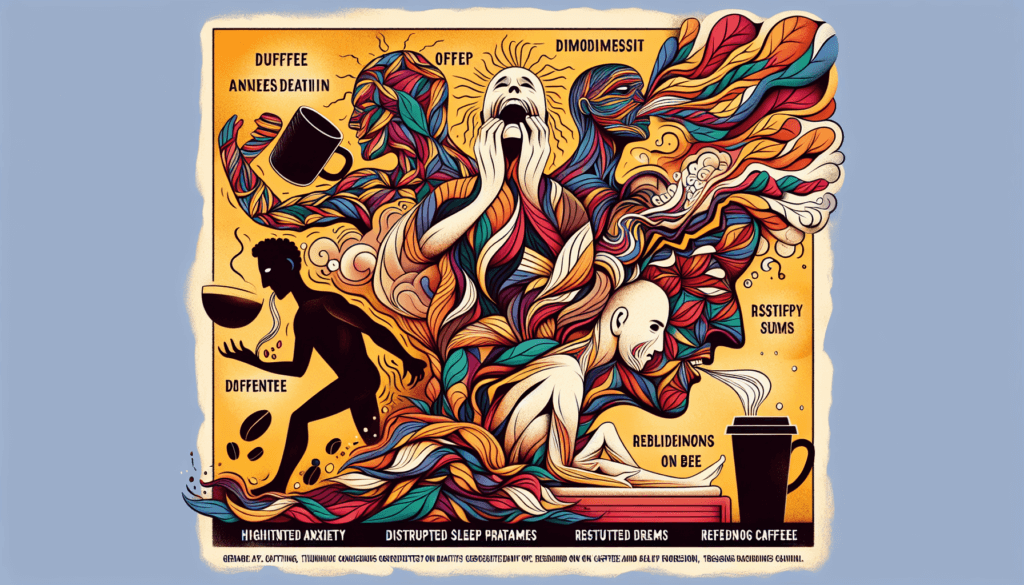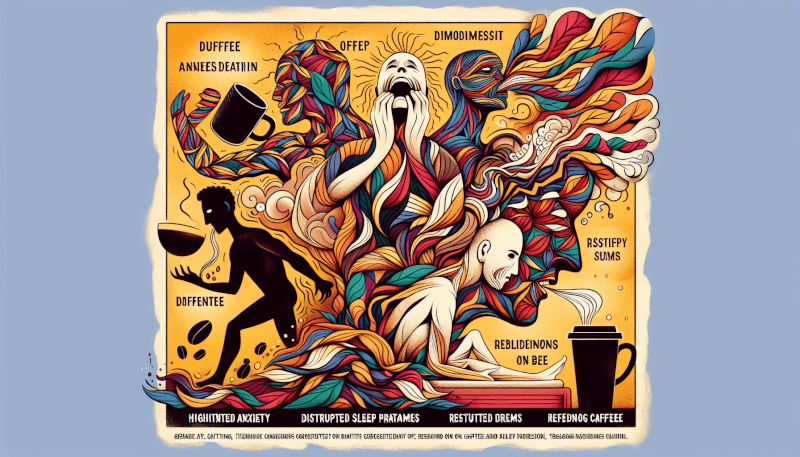Imagine waking up every morning to the rich aroma of freshly brewed coffee, the perfect start to your day. But have you ever wondered if your daily coffee ritual could be doing more harm than good? In this article, we will explore the reasons why drinking coffee every day may not be the best choice for your health. From the potential risks of caffeine addiction to the negative effects on sleep quality, you’ll discover the surprising reasons why you might want to reconsider that second cup. So grab a latte and get ready to learn why moderation may be the key when it comes to your beloved coffee fix.
Negative Effects of Daily Coffee Consumption
1. Disruption of Sleep Patterns
Coffee, as we all know, is a well-known stimulant due to its primary active ingredient, caffeine. While it may provide a much-needed morning boost, consuming coffee on a daily basis can wreak havoc on your sleep patterns.
1.1. Effects of Caffeine on Sleep
Caffeine has a direct impact on the central nervous system, stimulating the brain and increasing mental alertness. It blocks the effects of adenosine, a neurotransmitter that promotes sleep and relaxation. As a result, indulging in coffee during the day can make it much more challenging to fall asleep at night.
1.2. Insomnia and Restless Sleep
Regular coffee consumption has been linked to an increased risk of insomnia and restless sleep. The stimulating effects of caffeine can interrupt your body’s natural sleep-wake cycle, making it difficult to achieve the deep, restorative sleep your body needs to function optimally.
1.3. Impact on Circadian Rhythm
Your body’s internal clock, also known as the circadian rhythm, plays a crucial role in regulating sleep and wakefulness. However, the consumption of coffee can disrupt this delicate balance, leading to irregular sleep patterns and daytime drowsiness.
1.4. Decreased Total Sleep Time
Research has shown that daily coffee consumption can significantly decrease the total amount of sleep a person gets. This lack of sufficient sleep can have a detrimental effect on your overall health and well-being, leading to issues such as fatigue, difficulty concentrating, and decreased cognitive performance.
2. Dependency and Withdrawal Symptoms
One of the most concerning aspects of daily coffee consumption is the potential development of caffeine dependency and subsequent withdrawal symptoms.
2.1. Development of Caffeine Dependency
Regular intake of caffeine can lead to a physical and psychological dependency on the substance. Over time, your body may become accustomed to the stimulating effects of coffee, requiring higher doses to achieve the same level of alertness. This dependency can make it challenging to function without a morning cup of joe and can lead to a cycle of increased consumption.
2.2. Symptoms of Caffeine Withdrawal
If you decide to cut back on your coffee intake or quit cold turkey, you may experience caffeine withdrawal symptoms. These symptoms can include headaches, fatigue, irritability, and difficulties concentrating. These unpleasant side effects can make it difficult to reduce or eliminate your daily coffee habit.
2.3. Headaches and Fatigue
Caffeine withdrawal headaches are a common symptom experienced by those trying to reduce their coffee consumption. These headaches can be intense and debilitating, making it challenging to go about your daily activities. Additionally, fatigue and low energy levels are also common during the withdrawal period.
2.4. Mood Changes and Irritability
Caffeine withdrawal can also affect your mood, leading to increased irritability, anxiety, and even depression. These emotional changes can disrupt your daily life and relationships, further highlighting the negative impact of daily coffee consumption.

3. Increase in Anxiety and Stress Levels
Coffee and anxiety often go hand in hand, and for good reason. Regular consumption of coffee can significantly increase anxiety levels and exacerbate existing anxiety disorders.
3.1. Role of Caffeine in Anxiety
Caffeine acts as a stimulant on the central nervous system, triggering the release of adrenaline and other stress hormones. This can lead to feelings of restlessness, nervousness, and increased heart rate, making anxiety symptoms more pronounced.
3.2. Impact on Stress Hormone Levels
Studies have shown that coffee consumption can lead to an increase in cortisol, a stress hormone produced by the adrenal glands. Elevated cortisol levels can contribute to feelings of chronic stress, leading to further anxiety issues.
3.3. Exacerbation of Anxiety Disorders
For individuals already dealing with anxiety disorders, the consumption of caffeine can worsen symptoms, making anxiety harder to manage. It can heighten feelings of agitation, unease, and even trigger panic attacks in some cases.
3.4. Potential Panic Attacks
In some sensitive individuals, the high caffeine content in coffee can act as a trigger for panic attacks. Panic attacks can be incredibly distressing and lead to a significant decline in overall mental well-being.
4. Dehydration and Digestive Problems
While coffee might seem like a great way to quench your thirst, it can actually contribute to dehydration and cause a variety of digestive issues.
4.1. Diuretic Effect of Caffeine
Coffee has diuretic properties, meaning it increases urine production and can result in increased fluid loss from the body. This diuretic effect can lead to dehydration if you don’t increase your water intake accordingly.
4.2. Impact on Fluid Balance
Drinking caffeinated beverages can disrupt your body’s fluid balance, leading to feelings of thirst and potentially exacerbating existing dehydration. Chronic dehydration can impair digestion and overall bodily functions.
4.3. Gastrointestinal Distress
Coffee has been known to cause or worsen gastrointestinal problems such as acid reflux, heartburn, and stomach ulcers. The high acidity levels in coffee can irritate the lining of the stomach and esophagus, leading to discomfort and digestive issues.
4.4. Acid Reflux and Heartburn
If you suffer from acid reflux or heartburn, coffee can aggravate these conditions due to its ability to relax the lower esophageal sphincter. This relaxation can allow stomach acid to flow back up into the esophagus, causing painful symptoms.

5. Impact on Heart Health
Coffee’s effect on heart health is a topic of ongoing research, but several potential negative impacts have been identified.
5.1. Increase in Blood Pressure
Caffeine consumption, especially in large amounts, can cause a temporary increase in blood pressure. While this effect is generally seen in individuals who do not regularly consume caffeine, it can still pose risks for those with pre-existing hypertension or other heart conditions.
5.2. Influence on Cholesterol Levels
Studies have shown that unfiltered coffee – such as espresso and French press – can raise levels of LDL cholesterol, commonly referred to as “bad” cholesterol. Elevated LDL cholesterol is a risk factor for heart disease and other cardiovascular problems.
5.3. Activation of Stress Response
Coffee stimulates the release of stress hormones, such as adrenaline and cortisol, which can increase heart rate and blood pressure. These physiological responses can put added strain on the heart and may be problematic for individuals with cardiovascular issues.
5.4. Association with Heart Palpitations
For some individuals, the high caffeine content in coffee can trigger heart palpitations or irregular heartbeats. While this effect is more common in sensitive individuals, it highlights the potential cardiac risks associated with daily coffee consumption.
6. Risk of Osteoporosis
Osteoporosis, a condition characterized by brittle and weak bones, is a significant concern for many individuals, particularly women. Unfortunately, the daily consumption of coffee can contribute to an increased risk of developing this condition.
6.1. Effects of Caffeine on Calcium Levels
Caffeine has been shown to interfere with calcium absorption and increase urinary excretion of calcium. These effects can lead to inadequate calcium levels in the body, negatively impacting bone health and potentially contributing to the development of osteoporosis.
6.2. Decreased Bone Density and Increased Fracture Risk
Several studies have found a negative association between coffee consumption and bone mineral density. Long-term consumption of coffee, particularly in high quantities, has been linked to decreased bone density and an increased risk of fractures.
6.3. Impact on Calcium Absorption
Not only does coffee interfere with calcium absorption, but it also disrupts the body’s ability to use and retain calcium effectively. This interference can further contribute to the deterioration of bone health and increase the susceptibility to osteoporosis.

7. Staining and Erosion of Teeth
Coffee is notorious for staining teeth, leading to discoloration and undermining oral health.
7.1. Discoloration and Staining
The dark pigments present in coffee can adhere to the enamel of the teeth, leading to unsightly stains and discoloration over time. This can affect the aesthetic appeal of your smile and require costly professional teeth whitening treatments to rectify.
7.2. Erosion of Tooth Enamel
The acidity levels in coffee can erode the protective enamel coating on your teeth. With frequent consumption, this erosion can increase the risk of tooth decay, cavities, and dental sensitivity.
7.3. Teeth Sensitivity
The erosion of tooth enamel caused by coffee consumption can result in increased tooth sensitivity. This sensitivity can make eating and drinking certain foods and beverages uncomfortable or painful.
8. Triggering Migraines or Headaches
Although caffeine can sometimes alleviate headaches, it can also be a potential trigger for migraines and other types of headaches.
8.1. Caffeine as a Potential Trigger
In some individuals, the sudden withdrawal or decrease in caffeine intake can lead to caffeine withdrawal headaches or migraines. Additionally, for people prone to migraines, the high caffeine content in coffee can act as a trigger and result in painful episodes.
8.2. Blood Vessel Constriction and Dilation
Caffeine has the ability to constrict and dilate blood vessels in the brain. While this effect can provide temporary relief from certain types of headaches, it can also lead to rebound headaches or migraines once the caffeine wears off.
8.3. Inconsistent Effects on Headaches
The impact of coffee on headaches can vary greatly from person to person. While some individuals may find relief, others may experience increased frequency or severity of headaches. It is essential to be mindful of your own body’s response to coffee and adjust your consumption accordingly.

9. Interference with Medications
Coffee contains compounds that can interfere with the absorption and effectiveness of certain medications, potentially compromising their therapeutic benefits.
It is crucial to consult with a healthcare professional or pharmacist regarding any potential interactions between specific medications and coffee. They can provide guidance on whether it is safe to consume coffee while taking particular medications and recommend alternative options if necessary.
10. Impaired Calcium and Iron Absorption
Coffee’s impact on calcium and iron absorption can have significant consequences for overall health and well-being.
10.1. Inhibition of Mineral Absorption
The compounds found in coffee, such as polyphenols and tannins, can inhibit the absorption of essential minerals like calcium and iron. This interference can result in inadequate levels of these nutrients in the body, leading to various health issues.
10.2. Impact on Bone Health and Iron Deficiency
As mentioned earlier, coffee consumption can have adverse effects on calcium absorption and bone health. Furthermore, the inhibition of iron absorption can contribute to iron deficiency anemia, a condition characterized by low iron levels in the body.
10.3. Interaction with Nutrient-Rich Foods
Consuming coffee alongside nutrient-rich foods may further hinder the absorption of vital vitamins and minerals present in those foods. This interference can compromise the nutritional value of your diet and negatively impact overall health.
In conclusion, while a cup of coffee may be a comforting way to start your day, it is important to be mindful of the potential negative effects of daily coffee consumption. From disrupted sleep patterns and dependency to increased anxiety and stress levels, excessive coffee intake can have a wide range of adverse health impacts. It is essential to strike a balance and consider alternative beverages or limit coffee consumption to maintain overall health and well-being.



